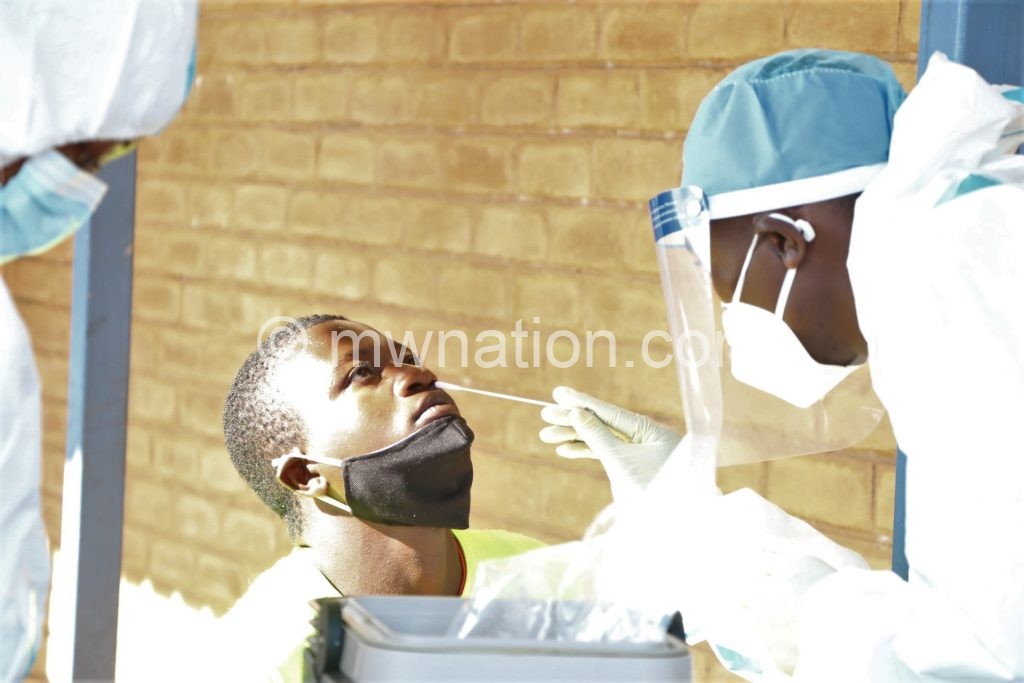‘Put health workers first’
Numbers of confirmed Coronavirus cases in Malawi are rapidly rising with a surge in locally transmitted infections.
However, healthcare workers are working in risky conditions to save lives.

“As we are registering an increase in Covid-19 cases and death rates, it is easy to forget the people who are making big sacrifices, diagnosing cases, tracing suspects, managing critical patients and saving lives,” says Gift Kawalazira, director of health and social services in Blantyre District.
He urges Malawians to pay a ‘special courtesy’ to all frontline healthcare workers as they need support and morale to sustain the fighting against coronavirus disease which has claimed 123 lives from the country’s 4 231 known cases.
Kawalazira states: “Everyone should take it upon themselves to do whatever they can to show appreciation to health workers for the amount of work and sacrifice they are making.
“Anything you can do to health workers—even just phoning them to say ‘thank you’, sending them a WhatsApp message or an e-mail, buying them lunch or a drink or waiving their rentals if you are a landlord, will motivate them to do better. We will need this morale boost, especially now that the situation is getting tough.”
Protecting healthcare
To boost healthcare workers’ spirits, Malawi-Liverpool Wellcome Trust (MLWT) recently donated personal protective equipment (PPE) worth K1.2 billion to Queen Elizabeth Central Hospital (QECH), Blantyre District Health Office, Zomba Central Hospital (ZCH) and Chikwawa District Hospital.
The N95 masks, three-ply surgical masks, plastic aprons, disposable aprons and gloves were procured using K2.1 billion from the UK-based Wellcome Trust. The hospitals will get enough supplies for three months from July to September.
Kawalazira says the donation will help protect healthcare workers to do their work without worrying about the risk of contracting or spreading the virus.
“This is the biggest consideration and appreciation. It tells healthcare workers that they are valued and cared for in these tough times,” he says.
MLWT associate director Janelisa Musaya says since there is no clear picture of the devastation Covid-19 is likely to cause in the country, it is better to take all the necessary precautions.
“Healthcare workers are one of the country’s most precious resources and their protection is important for them to continue responding to this pandemic and securing the future of Malawi’s health,” she says.
Aside the PPE provision, the clinical research institution is also providing Covid-19 diagnosis and it recently donated an oxygen plant at QECH which, apart from benefitting Covid-19 severe cases, will assist other patients requiring oxygen.
QECH deputy director Kelvin Mponda says the donation is timely as Covid-19 has left the busy facility in constant need of PPE.
He said: Every person entering the hospital is being screened and treated with caution. Various outpatients and acute care departments are also screening patients in addition to three wards set aside for managing patients with severe Covid-19.
“In all these places, we need healthcare workers to protect themselves and the patients coming in.”
Mponda says QECH once ran out of PPE and it took emergency orders to replenish them.
Therefore, the three-month consignment comes as a relief to the Southern Region’s largest referral hospital which sometimes survives on PPE donations.
“We still need plenty of PPE for health workers as the number of Covid-19 cases continue rising. There is always a need for more protective gear for our healthcare workers,” says Mponda.
But the demand for protective gear is equally huge in all health facilities at the heart of the national Covid-19 response.
ZCH director Martias Joshua says as community transmission is now more than double the count of imported cases, every patient is a potential Covid-19 case.
The caseload could be much higher than confirmed since shortage of test kits restricts testing to those with severe symptoms and contacts of those diagnosed with the virus.
“If we test everybody, we might be in millions now. As such, we know there are many patients who have not been diagnosed with Covid, but are having to meet our health workers.
“In the process, we are considering every patient as a Covid-19 case; hence, the need to have all healthcare workers use protective wear to minimise risks,” he says.
Before the donation, ZCH had just enough PPE to last two weeks.
“Even with PPE, the situation is already worrisome because we already have had six of our healthcare workers getting infected while wearing protective gear. However, having constant supply and wearing PPE keeps the workers at ease,” says Joshua.
Many are surviving
As the Covid-19 surge continues, Mponda says people’s focus should move from number of deaths to recoveries registered because only then will healthcare workers get the required consideration and appreciation.
He says: “There are many people that have survived and have come out of hospitals doing well because they got excellent care.
That is good. We are proud of the work happening so far. We are saving lives in those wards and hospitals. It’s an important story.”





